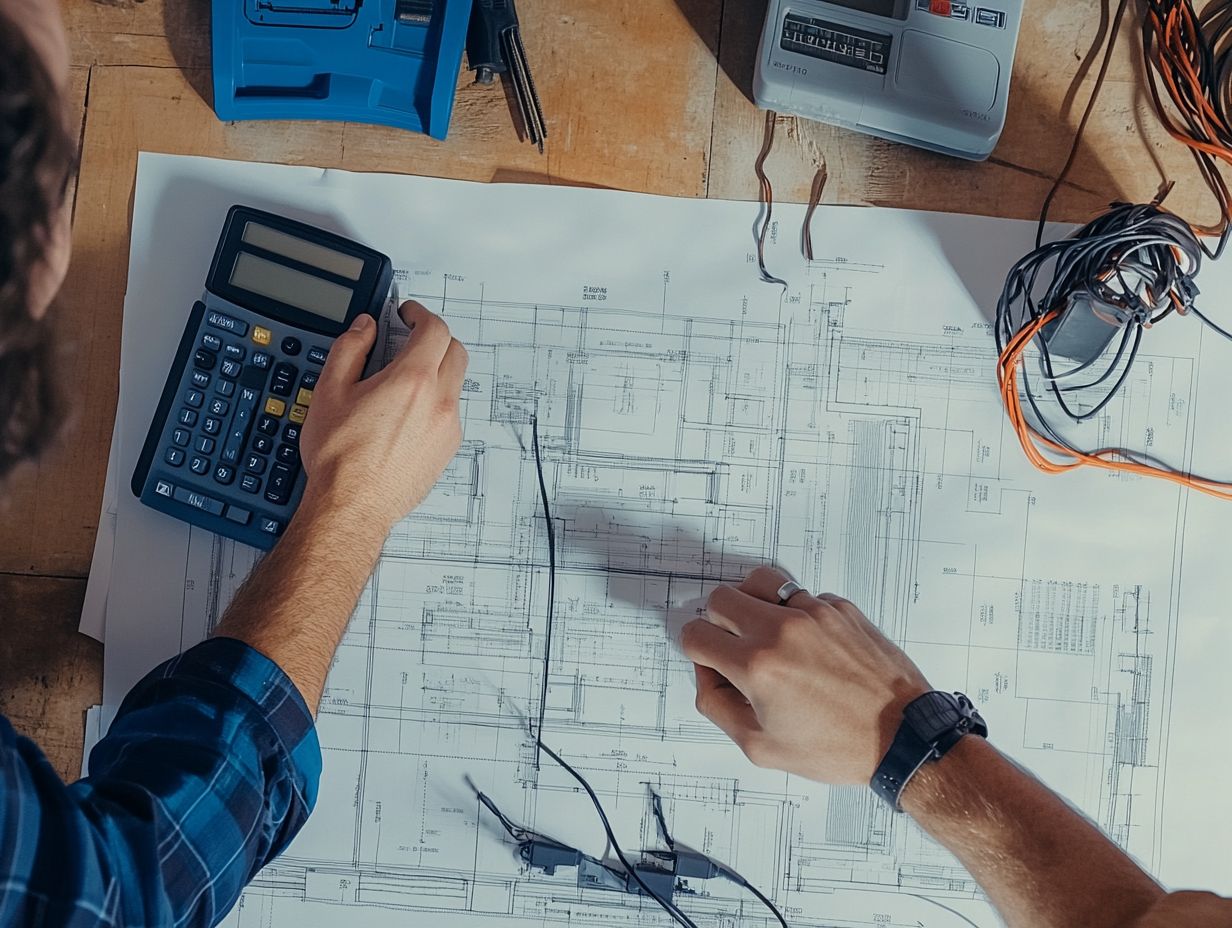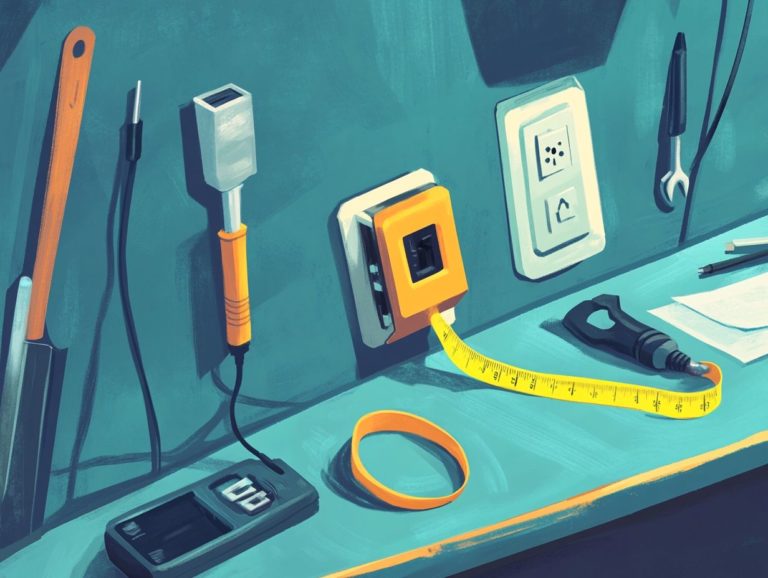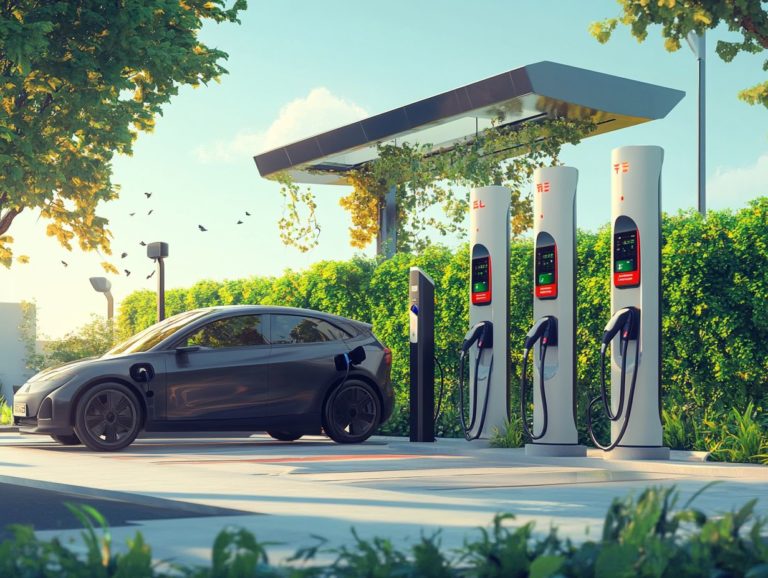Understanding the Costs of Installing Chargers
As electric vehicles (EVs) continue to gain traction, understanding the costs of installing EV chargers is crucial for prospective owners.
Several factors, from the type of charger you choose to the specific location of the installation, can significantly influence your overall expenses.
Get ready to explore the different types of chargers available, along with tips to save money and maximize your benefits!
Whether you’re poised to make the switch or merely exploring your options, this information will prove invaluable.
Contents
- Key Takeaways:
- Types of EV Chargers
- Factors Affecting the Cost of Installation
- Calculating the Total Cost of Installation
- Cost Breakdown
- Ways to Save on Charger Installation
- Long-Term Savings from EV Chargers
- Frequently Asked Questions
- What is the purpose of understanding the costs of installing chargers?
- What are the main factors that determine the costs of installing chargers?
- Is it necessary to hire a professional to install chargers?
- Are there any ongoing costs associated with installing chargers?
- Can the costs of installing chargers be offset by any incentives or subsidies?
- Do the costs of installing chargers differ for residential and commercial properties?
Key Takeaways:

- Installation costs for an EV charger depend on location, power capacity, and labor costs.
- Consider permits and upgrades to calculate the total installation cost effectively.
- There are ways to save on charger installation, including incentives and DIY options. EV chargers can also lead to long-term savings through reduced fuel and maintenance expenses.
Types of EV Chargers
Understanding the different types of EV chargers is essential for optimizing your electric vehicle charging experience. The distinctions among Level 1, Level 2, and DC fast chargers provide you with flexibility tailored to your specific needs, whether you’re charging at home, at work, or out in public.
Each type has its own unique features, charging speeds, and installation requirements. These factors can significantly influence the overall EV charging setup and your user experience. Innovative solutions from companies like SparkCharge enhance accessibility and efficiency in the charging network, paving the way for a more sustainable future.
Factors Affecting the Cost of Installation
Several factors influence the overall installation costs of EV charging stations, whether for residential or commercial setups. Key elements like the type of charging equipment, location, and accessibility play crucial roles in determining expenses.
Electrical upgrades and permitting requirements can also significantly affect the total investment. It’s essential to grasp these components if you’re considering installing chargers, as they directly impact both the affordability and practicality of integrating EV charging solutions into your existing infrastructure.
Finally, don’t overlook maintenance costs and ongoing electricity expenses they’re vital for a complete financial picture.
Location and Accessibility
The location and accessibility of an EV charging station are crucial factors that determine its usage and overall effectiveness within the charging network. Strategically placing these stations near residential areas, workplaces, and commercial centers can significantly enhance user engagement and convenience, allowing electric vehicle owners to charge their vehicles effortlessly.
Integrating charging stations into existing infrastructure like shopping centers or public parking lots optimizes energy efficiency and streamlines operational challenges.
Understanding local traffic patterns is key in selecting spots that attract a higher volume of potential users. Consider roadways leading to popular destinations or commuter routes to maximize visibility. Additionally, zoning regulations affect where you can install these stations, making collaboration between local governments and businesses essential for establishing an effective charging network.
Successful implementations in cities like San Francisco or Amsterdam highlight the importance of these considerations. By addressing these factors, you can contribute to increased usage and a smoother transition toward sustainable transportation solutions.
Power Capacity and Upgrades
Power capacity plays a pivotal role in your EV charger installation, shaping the speed and efficiency of the entire charging process. Depending on the charger level you choose whether it s Level 1 or DC fast charging you may need to consider different electrical upgrades to ensure optimal performance.
For instance, DC fast charging demands a more robust electrical system compared to Level 1. It s imperative for you to assess your existing electrical panel and grid capability before moving forward. By ensuring adequate power capacity, you enhance your charging experience and boost overall energy efficiency.
Understanding the power requirements for each charger type is crucial in preventing costly oversights during installation. Level 1 chargers typically use standard home outlets, which usually don t require major upgrades. In contrast, Level 2 chargers often need dedicated circuits and might call for an increase in the amount of electrical current (amperage).
When you re considering DC fast charging, the electrical setup becomes a key consideration. This could lead to significant installation costs if upgrades are necessary think transformer installations or enhanced circuit boards. Having a thorough assessment ensures that you meet both your current and future charging needs while keeping your budget intact.
Permitting and Labor Costs

Permitting and labor costs significantly shape the overall installation expenses of EV charging infrastructure, necessitating meticulous planning and consultation with local authorities.
You may need to secure various approvals, including building permits, electrical permits, and environmental assessments, depending on the scope of your project. These requirements can differ dramatically between states and municipalities, each boasting its own set of guidelines and timelines. These delays can significantly inflate your overall costs act swiftly!
Labor costs for installation can vary by region, influenced by local wage rates and the intricacy of the job, especially if specialized skills are required for advanced charging systems. This intricate web of regulations and expenses highlights the necessity of careful research and strategic planning for anyone contemplating the installation of EV charging stations.
Calculating the Total Cost of Installation
Calculating the total cost of installing an EV charger requires a thorough cost breakdown that encompasses multiple factors, such as equipment, labor, and ongoing expenses. It s essential to understand how each component contributes to the overall investment, especially if you re looking to implement effective charging solutions.
This detailed approach not only supports accurate budgeting but also enables you to make informed decisions about the most suitable charging infrastructure for your specific needs. By meticulously examining installation costs, you can gain valuable insights into the viability of various charging options.
Cost Breakdown
A clear look at costs for EV charger installation uncovers essential considerations that can significantly impact your final expenses. From the initial purchase price of the charging equipment to ongoing electricity costs, each element shapes the overall financial landscape. You ll want to grasp factors such as installation location, permitting fees, and potential electrical upgrades which may include enhancements to your electrical panel to make informed decisions about your EV charging infrastructure. Analyzing these costs helps you develop a more accurate budget and achieve an optimal long-term investment.
Each component plays a crucial role:
- The type of charger you choose whether it s a level 2 charger (which provides a moderate charging speed) or a DC fast charger (a type of charger that provides quick charging) will determine your initial equipment costs, with the latter generally being pricier.
- Labor expenses are another consideration, influenced by regional wage differences and the complexity of the installation.
- Local governments may impose varying permitting fees, and you might face the need for electrical upgrades, which can significantly impact your overall budget. For example, upgrading a panel to accommodate the charger can add thousands to your total.
Electricity costs, which can fluctuate depending on local utility rates, are also critical, especially for commercial installations anticipating high usage. Understanding these components allows you to create a comprehensive budget that anticipates both your current and future financial commitments.
Ways to Save on Charger Installation
Identifying strategies to save on charger installation costs is vital for enhancing the advantages of electric vehicle ownership. You can significantly reduce your upfront expenses by taking advantage of available incentives and rebates.
You can also consider DIY installation options, which enable you to control your charging solutions without breaking the bank. By leveraging these approaches, you can make informed decisions that resonate with your financial objectives while also playing a part in fostering a sustainable energy future.
Incentives and Rebates
Incentives and rebates are invaluable tools that can significantly reduce the costs associated with installing EV chargers, making this transition more accessible for you.
For example, if you re a homeowner looking to electrify your transportation, federal tax credits can cover a substantial portion of your installation expenses. Some states also offer their own unique incentives, such as rebates from the California Electric Vehicle Infrastructure Project, designed specifically to enhance the charging station network.
Collaborating with local businesses and municipalities can unlock further discounts, making the shift to sustainable energy even more enticing. By exploring these financial aids, you can greatly lower your upfront costs while also contributing to the growing adoption of electric vehicles in your community.
DIY Installation Options

Exploring DIY installation options for EV chargers can offer you considerable savings on installation costs while granting the flexibility to customize your charging solutions. If you possess some technical know-how and can handle electric vehicle supply equipment, taking on the installation yourself can significantly reduce labor expenses and streamline the entire project.
However, it s crucial to keep safety regulations and local permitting requirements in mind to ensure compliance throughout the process.
While the potential for cost savings is enticing, it s equally important to assess the risks involved. An inadequate installation could lead to electrical hazards or equipment malfunctions, resulting in costly repairs.
Navigating local regulations can present additional challenges for those new to DIY projects. By properly evaluating your skills, understanding the necessary materials, and adhering to manufacturer guidelines, you can make informed decisions that will benefit you in the long run.
If you’re considering this route, be sure to delve into online resources and community forums for valuable insights and tips that can elevate your DIY experience.
Long-Term Savings from EV Chargers
Investing in EV chargers does more than just meet your immediate charging needs; it opens the door to significant long-term savings for electric vehicle owners like you.
Over time, the reduced fuel costs of electric vehicles, compared to traditional gasoline-powered cars, can bring you substantial financial benefits. Lower maintenance expenses contribute to the overall value of embracing electric vehicle technology, thanks to fewer moving parts and enhanced energy efficiency.
Recognizing these long-term savings can encourage you to switch to sustainable transportation.
Reduced Fuel Costs and Maintenance Expenses
Transitioning to electric vehicles can lead to a remarkable reduction in fuel and maintenance costs, making them a financially savvy alternative to traditional vehicles. When powered by clean energy sources, you’ll enjoy lower overall energy expenses.
The fewer mechanical components in electric vehicles mean less frequent repairs and longer lifespans, which translates to significant savings over time. This financial edge pairs beautifully with the environmental benefits, fostering a more sustainable transportation approach.
The energy efficiency of electric vehicles amplifies these savings, as they convert a greater percentage of electrical energy from the grid into usable power at the wheels compared to the combustion of fossil fuels in traditional engines. Consequently, you’ll often witness substantial savings at the pump, especially in regions where electricity costs are lower than gasoline.
These accumulated savings can enable you to recoup your initial investment in electric technology over time. Longevity is another compelling benefit; electric vehicles typically face fewer wear-and-tear issues, which not only reduces ownership costs but also ensures a more reliable driving experience.
Frequently Asked Questions
-
What is the purpose of understanding the costs of installing chargers?
Understanding the costs of installing chargers is crucial for anyone considering adding charging infrastructure for electric vehicles. Knowing what to consider when installing a charger helps make informed decisions and plan for the required financial investment.
-
What are the main factors that determine the costs of installing chargers?
The costs of installing chargers can vary based on key factors, including the type and number of chargers, the location and site preparation needed, and any additional features or services desired.
-
Is it necessary to hire a professional to install chargers?
While it is possible to install chargers yourself, hiring a professional is highly recommended for safety and proper installation. This can help avoid costly mistakes that may arise from DIY installation.
-
Are there any ongoing costs associated with installing chargers?
Yes, there may be ongoing costs associated with installing chargers, such as electricity costs and maintenance expenses. It’s important to consider these factors when determining the overall costs of installing and operating chargers.
-
Can the costs of installing chargers be offset by any incentives or subsidies?
Yes, various incentives and subsidies are available to help offset the costs of installing chargers. These can include tax credits, grants, and rebates, which may vary by location and type of charger installed.
-
Do the costs of installing chargers differ for residential and commercial properties?
Yes, the costs of installing chargers can differ for residential and commercial properties due to differences in wiring and installation requirements. Consulting with a professional can help determine the specific costs for your property.






